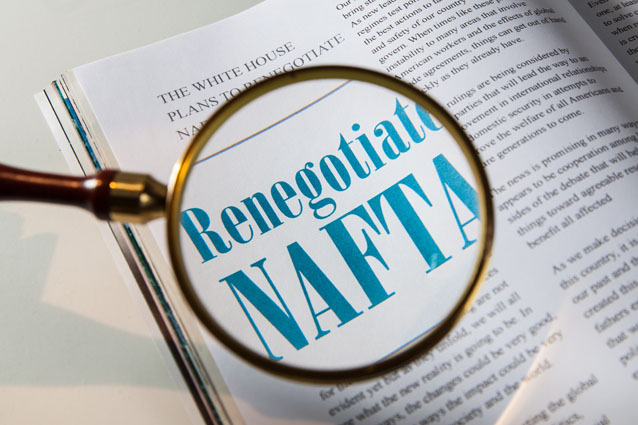Personal Wealth Management / Economics
Checking In on Trump and Trade
The Trump administration has seemingly softened its anti-trade stance.

Less to fear upon closer inspection. (Photo by -Oxford-/iStock.)
The G-20 finance ministers' meeting finally achieved its annual goal of hogging headlines Monday, when news broke that US Treasury Secretary Steve Mnuchin forced his colleagues to delete this sentence from the summit statement: "We resist all forms of protectionism." It was a slow news day. Most observers concluded Mnuchin had fired the first shot in the Trump trade war, fulfilling investors' widespread fear. But in our view, this is too hasty. For one, G-20 statements have always been unenforceable platitudes that don't mean much once you diagram the sentences. Moreover, it's an isolated incident. Other recent developments suggest the Trump administration is actually softening its stance on trade, lowering the risk of a big protectionist push and global backlash.
Actions speak louder than words, but a lack of action can also be telling-especially if it involves timestamped campaign pledges going unfulfilled. Consider, for instance, what has come of Trump's trade-related day-one pledges: "I will announce my intention to renegotiate NAFTA or withdraw from the deal under Article 2205 [and] I will direct my Secretary of the Treasury to label China a currency manipulator [supposedly a prelude to tough trade sanctions]."[i] It's now 62 days in, and the only movement on either of these fronts has been to walk them back.
On the Origin of Auto Parts
Talk is cheap, but comments from Commerce Secretary Wilbur Ross-who has taken the lead so far[ii] on NAFTA-suggest building on it and crafting a "sensible" deal rather than scrapping it outright. When asked for specifics, Ross has focused on where auto parts are sourced: "First of all, I think the rules of origin were far too lenient [in NAFTA] ... Rules of origin means how much goods can come in from countries outside NAFTA - and yet get all the benefits of absolution from tariffs. ... I think those can be tightened up quite a bit." The implication, at least for auto parts, is NAFTA's requirement that 62.5% of content comes from North America can be raised, more strictly enforced or both.
On one hand, this highlights that trade pacts are mercantilist and hardly "free." But it also shows talks are likely to center on tweaks to existing rules and additions to cover digital markets, rather than just ripping up the agreement. What markets care about are major disruptions to existing trade patterns. This doesn't look like that. It might even make trade within NAFTA freer, depending how the negotiations evolve, positively surprising investors.
The Yuan Yawn
Labeling China a currency manipulator might sound like a meaningless procedural move, but it technically would allow the administration to slap broad tariffs on Chinese imports, which could invite retaliation. On the campaign trail Trump threatened to slap a 45% tax on Chinese imports as punishment for "unfair" trade practices. But when Mnuchin was asked directly whether he would label China a currency manipulator, he said: "No announcement on currency manipulation will come before the Treasury's April report." Going from day one to maybe in April isn't that reassuring, but under Treasury's own definition, China isn't a currency manipulator. That requires:
- A bilateral trade surplus with the US exceeding $20 billion.
- A current account surplus greater than 3% of its GDP.
- Foreign exchange intervention over 2% of its GDP.
China meets only the first criterion.[iii] To the extent it is intervening in currency markets, it is to push the yuan up, not down, as evidenced by its steady selling of US Treasurys. The Treasury could change the definition to single out China or Ross could declare currency manipulation an "unfair subsidy," which would allow US companies to bring anti-subsidy actions to the Commerce Department. But here, too, China's support of the yuan makes it rather beyond the point.
President's Priority Is Reelection
Trump's campaign rhetoric on trade wasn't yuuuuuugely different from Barack Obama's, Bill Clinton's, Mitt Romney's or John McCain's. In 2008, President Obama campaigned on renegotiating or killing NAFTA, just like Trump. Bill Clinton also campaigned against NAFTA. McCain and Romney talked tough on China and currency manipulation. Presidential candidates long ago figured out protectionism is an easy sell with voters. But once in office, faced with the reality that trade is good for the economy and jobs, presidents have relented. Or, at least, their protectionist actions don't amount to very much. Virtually all presidents slap minor tariffs on selected (highly visible) imports from time to time. Even George W. Bush, who largely postured as a free trader, tried to protect American steel from "dumping." But contrary to campaign trail bluster, Obama finished the Korean and Colombian Free Trade Agreements and then championed the Trans-Pacific Partnership (TPP) and Transatlantic Trade and Investment Partnership (a US-EU pact). Clinton signed NAFTA and became one of its biggest advocates.
Given the amount of chatter, much of it contradictory, it's impossible to say where things go from here. But politicians like getting reelected, and destroying jobs with protectionist policy doesn't improve their chances. Some 5 million US jobs depend on trade with Mexico, and around 14 million rely on North American trade. Chinese trade supports an estimated 2.6 million US jobs. Quibble with the numbers, but once (mutually beneficial) cross border trade is established, it's difficult and painful to break up the supply chain.
Actions-or lack thereof-are what matter, and the Trump administration's first 62 days look a lot less protectionist than campaign rhetoric suggested. While we can't rule out trade tensions rising eventually-it's still early days-the more Trump's trade team and policies takes shape, the less uncertainty investors face, reducing a sentiment headwind for stocks.
[i] Never mind that Treasury Secretary Steve Mnuchin was not confirmed until day 25 (February 13).
[ii] US Trade Representative nominee Robert Lighthizer has yet to be confirmed.
[iii] Funnily, Germany-which doesn't have a currency to manipulate-meets two of three.
If you would like to contact the editors responsible for this article, please message MarketMinder directly.
*The content contained in this article represents only the opinions and viewpoints of the Fisher Investments editorial staff.
Get a weekly roundup of our market insights
Sign up for our weekly e-mail newsletter.

You Imagine Your Future. We Help You Get There.
Are you ready to start your journey to a better financial future?

Where Might the Market Go Next?
Confidently tackle the market’s ups and downs with independent research and analysis that tells you where we think stocks are headed—and why.





